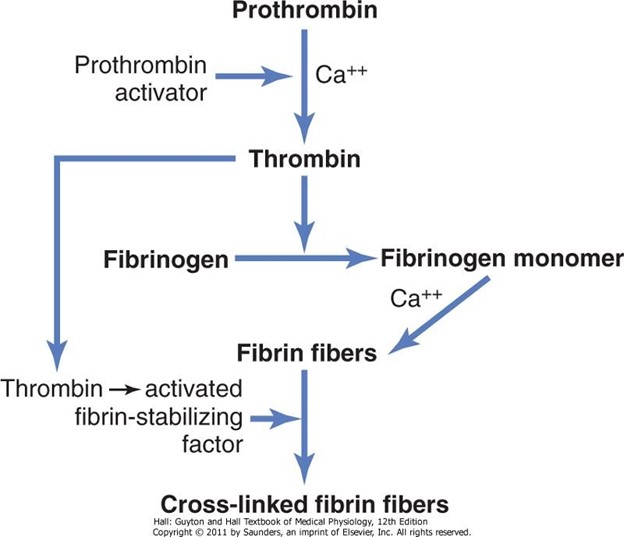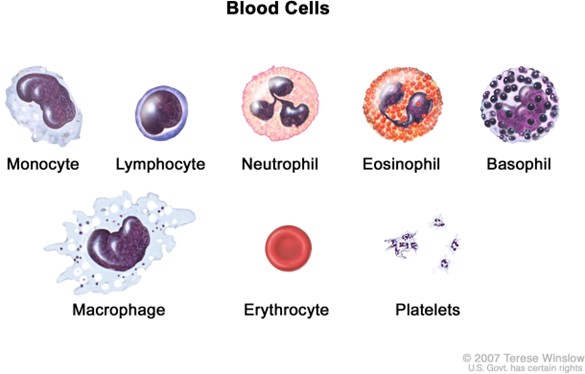The basic event in the formation of a blood clot is the change of:
Thrombin to prothrombin.
Fibrinogen to fibrin.
Vitamin K to prothrombin.
Fibrin to fibrinogen.
The Correct Answer is B

This is because fibrinogen is a soluble protein in the blood plasma that is converted to insoluble fibrin strands by the enzyme thrombin during blood clotting. Fibrin forms a mesh-like network that traps platelets and other blood cells to form a clot.
Choice A is wrong because thrombin is not converted to prothrombin, but rather prothrombin is converted to thrombin by another enzyme called prothrombinase.
Choice C is wrong because vitamin K is not converted to prothrombin, but rather vitamin K is required for the synthesis of prothrombin and other clotting factors in the liver.
Choice D is wrong because fibrin is not converted to fibrinogen, but rather fibrinogen is converted to fibrin as explained above.
Normal ranges of fibrinogen in the blood are 200 to 400 mg/dL.
Normal ranges of prothrombin time (a measure of how long it takes blood to clot) are 11 to
13.5 seconds.
Nursing Test Bank
Naxlex Comprehensive Predictor Exams
Related Questions
Correct Answer is A
Explanation
A monocyte is a type of white blood cell that is markedly larger than a red blood cell and has a large kidney-shaped nucleus.

Monocytes are involved in defending the body against infectious diseases and foreign materials.
Choice B is wrong because a basophil is a type of granular white blood cell that has a lobed nucleus and stains purple with basic dyes.
Basophils are involved in allergic reactions and inflammation.
Choice C is wrong because a neutrophil is a type of granular white blood cell that has a multilobed nucleus and stains pale pink with neutral dyes.
Neutrophils are involved in phagocytosis and killing bacteria.
Choice D is wrong because an eosinophil is a type of granular white blood cell that has a bilobed nucleus and stains red-orange with acidic dyes.
Eosinophils are involved in combating parasitic infections and allergic responses. The normal ranges of different types of blood cells are:
Red blood cells: 4.5 to 5.9 million per microliter (mcL) for males, 4.1 to 5.1 million per mcL for females
White blood cells: 4,000 to 11,000 per mcL for both males and females
Platelets: 150,000 to 450,000 per mcL for both males and females
Correct Answer is C
Explanation
Basophils usually account for the smallest percentage of leukocytes in a blood sample. Basophils are a type of white blood cell that is involved in allergic reactions and inflammation.
Choice A is wrong because eosinophils are not the least common type of leukocyte.
Eosinophils are another type of white blood cell that is involved in allergic responses and parasitic infections.
They typically make up about 1-6% of the total leukocyte count.
Choice B is wrong because monocytes are not the least common type of leukocyte.
Monocytes are a type of white blood cell that can differentiate into macrophages and dendritic cells, which are important for phagocytosis and antigen presentation.
They typically make up about 2-10% of the total leukocyte count.
Choice D is wrong because neutrophils are not the least common type of leukocyte.
Neutrophils are a type of white blood cell that are the first responders to bacterial infections and tissue damage.
They typically make up about 55-70% of the total leukocyte count.
Whether you are a student looking to ace your exams or a practicing nurse seeking to enhance your expertise , our nursing education contents will empower you with the confidence and competence to make a difference in the lives of patients and become a respected leader in the healthcare field.
Visit Naxlex, invest in your future and unlock endless possibilities with our unparalleled nursing education contents today
Report Wrong Answer on the Current Question
Do you disagree with the answer? If yes, what is your expected answer? Explain.
Kindly be descriptive with the issue you are facing.
